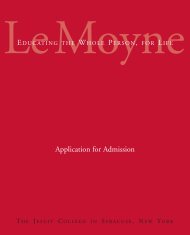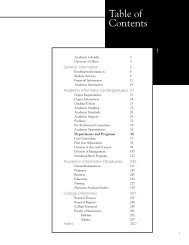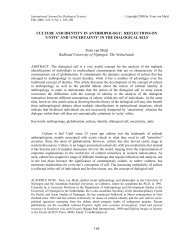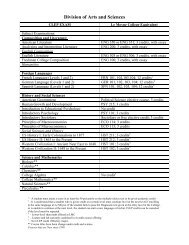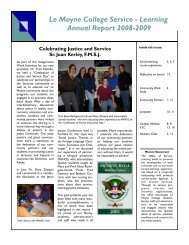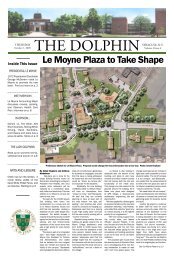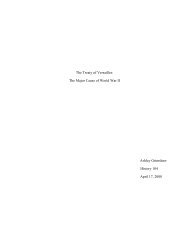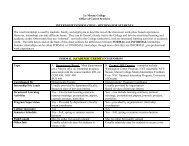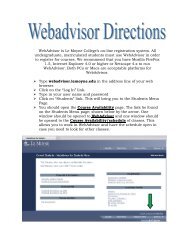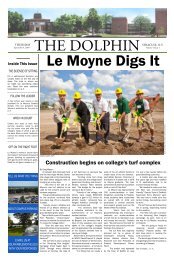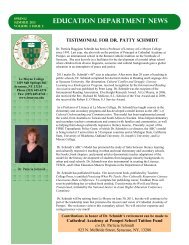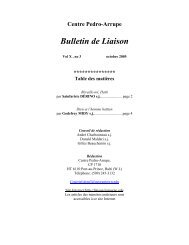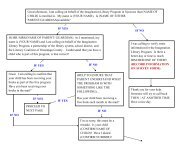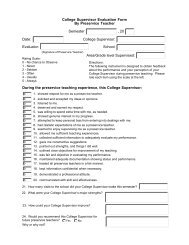The Causes and Consequences of Miscommunication - Le Moyne ...
The Causes and Consequences of Miscommunication - Le Moyne ...
The Causes and Consequences of Miscommunication - Le Moyne ...
You also want an ePaper? Increase the reach of your titles
YUMPU automatically turns print PDFs into web optimized ePapers that Google loves.
<strong>The</strong> <strong>Causes</strong> <strong>and</strong> <strong>Consequences</strong><br />
<strong>of</strong> <strong>Miscommunication</strong><br />
<strong>The</strong> Misunderst<strong>and</strong>ing Between Britain <strong>and</strong> the United States<br />
Following the Nationalization <strong>of</strong> the Suez Canal<br />
1<br />
Shannon O'Toole<br />
HST 302<br />
Dr. Blaszak<br />
11 November 2009
Following the nationalization <strong>of</strong> the Suez Canal, the fracture in the American <strong>and</strong> British<br />
relationship formed as a result <strong>of</strong> each country's failure to communicate with <strong>and</strong> properly<br />
underst<strong>and</strong> one another. <strong>The</strong> United States, while making it clear they would not support force or<br />
use it themselves, did not come out <strong>and</strong> say that they would actually oppose it. British Prime<br />
Minister Anthony Eden made it quite clear how focused <strong>and</strong> determined he was to take Nasser<br />
down. Given his obsession, the Prime Minister needed to be told pointblank that if he resorted to<br />
force, the United States would st<strong>and</strong> against him. Though the United States knew <strong>of</strong> the military<br />
planning taking place, they still counted on the special relationship they believed they shared<br />
with Britain. <strong>The</strong>y could not see how Britain could take such drastic action without American<br />
support <strong>and</strong> felt Britain could easily be dissuaded from resorting to such drastic measures.<br />
Some fault also lies with the two most important men in the crisis in the United States:<br />
President Dwight D. Eisenhower <strong>and</strong> Secretary <strong>of</strong> State John Foster Dulles. Eisenhower seemed<br />
to be in the background <strong>of</strong> foreign policy, <strong>and</strong> it was believed in Britain when military action<br />
took place, they could depend on the laidback American President to at worst just sit back <strong>and</strong><br />
watch the events unfold. <strong>The</strong>y never imagined that he would play a vital role in ending the<br />
military occupation. <strong>The</strong>re were also claims on the British side that Dulles, who was prone to an<br />
eloquent <strong>and</strong> powerful use <strong>of</strong> words, confused the United States' stance at time. Dulles also had a<br />
rocky relationship with Britain's Prime Minster, which was certainly to blame for some <strong>of</strong> their<br />
miscommunication.<br />
Britain's part in this misunderst<strong>and</strong>ing was its failure to see that the United States would<br />
not support diplomatically or militarily using force. Eisenhower made his disapproval <strong>of</strong> force<br />
very clear, but Britain was under the impression that he would not interfere, especially given the<br />
looming presidential election.<br />
2
A key factor in Britain's downfall in this crisis was its Prime Minister Anthony Eden<br />
whose poor physical health was taking a great toll on his mental state. He became focused to the<br />
point <strong>of</strong> obsession on taking down President Nasser. A lot <strong>of</strong> politics involves reading between<br />
the lines, <strong>and</strong> Eden failed to do that because he <strong>and</strong> his colleagues were so intensely focused on<br />
their militant objectives. <strong>The</strong>y also depended on the special relationship. Eden felt that the<br />
history they had with the notably easy-going Eisenhower <strong>and</strong> the United States as a whole would<br />
prevent open opposition to military action.<br />
Prime Minister Anthony Eden had served under Winston Churchill, <strong>and</strong> when Churchill<br />
retired, it was Eden who took the position as Prime Minister. Eden, a man described as having "a<br />
strong temper <strong>and</strong> impatience" <strong>and</strong> a "hatred <strong>of</strong> criticism <strong>and</strong> obstinacy," navigated the House <strong>of</strong><br />
Commons with ease, keeping his temperament in check. 1 He was able to control his nerves <strong>and</strong><br />
moods in international situations <strong>and</strong> proved to be a highly skilled diplomat. This changed,<br />
however, when Eden suffered significant health issues. His tendency to be anxious <strong>and</strong> easily<br />
<strong>of</strong>fended was only increased by these bouts <strong>of</strong> illness. In 1945 he had a duodenal ulcer, in 1952<br />
he had a bout <strong>of</strong> jaundice, <strong>and</strong> in 1953 he had two operations for gallstones that went terribly<br />
wrong. His bile duct was injured, causing him to be prone to fevers <strong>and</strong> jaundice. Though he was<br />
told by his doctor to not serve as Foreign Secretary, Churchill convinced Eden to take the<br />
position. Because Eden had h<strong>and</strong>led being Foreign Secretary, when the opportunity arose for him<br />
to be Prime Minister, he felt that he was capable <strong>of</strong> h<strong>and</strong>ling it. 2 Due to his poor health, he<br />
carried with him "a great chest <strong>of</strong> pills" wherever he went <strong>and</strong> even had injections sometimes. 3<br />
Due to his health issues, his ability to deal with big issues was questioned by his colleagues <strong>and</strong><br />
1 Hugh Thomas, Suez (New York: Harper & Row, Publishers, 1967), 35.<br />
2 Keith Kyle, Suez (New York: St. Martin's Press, 1991), 69.<br />
3 Kyle, Suez, 69.<br />
3
his growing "tendency to fuss" was noticed. 4 His health further deteriorated from working too<br />
much <strong>and</strong> getting little sleep due to calls in the middle <strong>of</strong> the night from different time zones. His<br />
exhaustion <strong>and</strong> illness were beginning to cloud his judgment <strong>and</strong> ability to h<strong>and</strong>le an issue as<br />
complex as the Suez Crisis, <strong>and</strong> those who worked with him were beginning to notice. 5 In a diary<br />
entry, Lord Moran writes <strong>of</strong> the Prime Minister: "<strong>The</strong> political world is full <strong>of</strong> Eden's moods at<br />
No. 10. All this is known to Winston…At the back <strong>of</strong> his mind, as I keep finding out, is the<br />
disconcerting fact that he put Anthony where he is." 6 What is most unfortunate for both Engl<strong>and</strong><br />
<strong>and</strong> Eden himself is that "what Engl<strong>and</strong> required in 1956 was a man such as Eden had been till<br />
then." 7 When Nasser nationalized the Canal, it only worsened Eden's deteriorating mental state.<br />
He became obsessively intent on the removal <strong>of</strong> Nasser, <strong>and</strong> "was out <strong>of</strong> sync with his old<br />
cautious, compromising self. He was obsessed, a driven man, his vast experience <strong>and</strong> intellect<br />
reduced to tunnel vision. At the end <strong>of</strong> that tunnel was Nasser." 8<br />
<strong>The</strong>re was also a great deal <strong>of</strong> confusion in Britain as to who was in charge <strong>of</strong> foreign<br />
policy in the United States. Many believed that Eisenhower was not the one in power. He was<br />
perceived as being "a non-intellectual, rather too much given to the temptation to relax." 9 <strong>The</strong><br />
written replies from his conferences were difficult to underst<strong>and</strong> <strong>and</strong> he had also experienced<br />
some poor health, including a heart attack in his first term as President. Another reason he was<br />
seen as uninvolved was thanks to the "pronounced personality" <strong>of</strong> Secretary <strong>of</strong> State John Foster<br />
Dulles. 10 Dulles, who was once a religious leader, was inclined to give passionate <strong>and</strong> wordy<br />
speeches that could lead to some confusion as to both the message <strong>and</strong> as to who was making<br />
4 Kyle, Suez, 69.<br />
5 Donald Neff, Warriors at Suez (Brattleboro: Amana Books, 1988), 183.<br />
6 Thomas, in, Donald Neff, Warriors at Suez (Brattleboro: Amana Books, 1988), 278.<br />
7 Thomas, 36.<br />
8 Neff, 278.<br />
9 Kyle, Suez, 45.<br />
10 Kyle, Suez, 45.<br />
4
decisions. When the collusion among Britain, France <strong>and</strong> Israel came to light, however, it is clear<br />
that Eisenhower was indeed the man in charge <strong>and</strong> Dulles carried out the President's orders.<br />
Dulles's aptness to long-winded speeches is one <strong>of</strong> the reasons that he <strong>and</strong> Eden had a<br />
very poor relationship. <strong>The</strong> two statesmen had disliked one another for many years. Eden even<br />
requested that Eisenhower name someone else as Secretary <strong>of</strong> State instead <strong>of</strong> Dulles. <strong>The</strong>y have<br />
been described as being "prima donnas," each in their own right. 11 Dulles thought things through<br />
<strong>and</strong> used reason, where Eden relied on his intuition to make decisions. Dulles's constant<br />
analyzing <strong>and</strong> excessive speeches left Eden bored <strong>and</strong> <strong>of</strong>ten annoyed. 12 It was also these<br />
excessive speeches that sometimes led the British to believe that the Secretary felt as strongly<br />
about Nasser as they did. 13 Eden even wrote <strong>of</strong> their inability to see eye to eye in his memoirs:<br />
My difficulty in working with Mr. Dulles was to determine what he really meant<br />
<strong>and</strong> in consequence the significance to be attached to his words <strong>and</strong> actions….A<br />
preacher in a world <strong>of</strong> politics, Mr. Dulles seemed sometimes to have little regard<br />
for the consequences <strong>of</strong> his words. 14<br />
Dulles’s way with words <strong>and</strong> Eden’s determination to rationalize using force proved to be a<br />
deadly combination.<br />
Before President Gamal Abdel Nasser nationalized the waterway in July 1956, Britain<br />
<strong>and</strong> the United States were for the most part <strong>of</strong> the same mind in regards to dealing with the<br />
Middle East <strong>and</strong> presented a united front. Though tensions certainly existed, the two powers<br />
worked together to meet common goals in the region. <strong>The</strong> break took place directly after the<br />
nationalization when Britain turned immediately to a military response <strong>and</strong> the United States<br />
chose to address the issue diplomatically.<br />
11 Kyle, Suez, 46.<br />
12 Thomas, 54.<br />
13 Thomas, 54.<br />
14 Full Circle, in Louise Richardson, When Allie Differ: Anglo-American Relations During the Suez <strong>and</strong> Falkl<strong>and</strong>s<br />
Crisis (New York: St. Martin’s Press, 1996), 193.<br />
5
In spite <strong>of</strong> some tensions, the United States <strong>and</strong> Britain had a history <strong>of</strong> working together<br />
in the Middle East. Britain, for its part, felt a certain entitlement in the Middle East. After the fall<br />
<strong>of</strong> the Turkish Empire, Britain played a part in the successful conclusion to the World Wars in<br />
that area <strong>and</strong> had defended Egypt on two occasions. Britain also needed power in the Middle<br />
East due to its dependency on the oil found there. <strong>The</strong> Suez Canal itself was vital for the<br />
transportation <strong>of</strong> oil, among other things, from the Middle East to the greater empire. Although<br />
Britain seemed to have a greater stake in the region, the allies collaborated on many different<br />
issues there. <strong>The</strong>y created plans for Arab-Israeli peace, worked together on the formation <strong>of</strong> the<br />
Baghdad Pact, <strong>and</strong> though they differed on how much <strong>of</strong> a threat Nasser was, they agreed that he<br />
was indeed a power that needed to be monitored <strong>and</strong> controlled. Prior to the nationalization they<br />
had worked together to weaken Nasser’s influence <strong>and</strong> power by refusing to send arms, delaying<br />
shipment <strong>of</strong> grains, oil, <strong>and</strong> aid, <strong>and</strong> also kept Nasser waiting for an answer in regards to funding<br />
the Aswan Dam. <strong>The</strong>y strengthened surrounding states like Ethiopia, <strong>Le</strong>banon <strong>and</strong> Jordon, <strong>and</strong><br />
promoted anti-Nasser propag<strong>and</strong>a in other Arab states. 15 When Nasser made the Czech Arms<br />
Deal public, both nations were horrified to see the USSR's h<strong>and</strong> extending into the Middle East.<br />
With this new development, the two allies were much less keen to grant the proposed loan to<br />
construct the Aswan Dam <strong>and</strong> backed away from the agreement.<br />
<strong>The</strong> United States <strong>and</strong> Great Britain formally withdrew the loan proposal within two days<br />
<strong>of</strong> one another, providing a list <strong>of</strong> reasons why they had decided not to follow through with the<br />
<strong>of</strong>fer as planned. <strong>The</strong>y claimed that they could not see how Egypt could put the necessary<br />
resources towards the construction <strong>of</strong> the Canal. Britain <strong>and</strong> the United States also expressed<br />
concern that they might bear the brunt <strong>of</strong> the blame if anything, such as the economy <strong>and</strong><br />
15<br />
Robert Bowie, “Eisenhower, Dulles, <strong>and</strong> the Suez Crisis,” in Suez 1956, ed. WM. Roger Louis <strong>and</strong> Roger Owen<br />
(Oxford: Clarendon Press), 191-2.<br />
6
st<strong>and</strong>ards <strong>of</strong> living in Egypt, were to go wrong during the dam construction. <strong>The</strong> withdrawal was<br />
met with shock in Egypt <strong>and</strong> Nasser felt that he had been betrayed.<br />
It was in light <strong>of</strong> this withdrawal <strong>and</strong> the desire to rid Egypt <strong>of</strong> imperial influences that on<br />
July 26, 1956, Nasser announced the nationalization <strong>of</strong> the Suez Canal. 16 Although so far the<br />
United States <strong>and</strong> Britain had acted together in spite <strong>of</strong> some minor differences, the view <strong>of</strong> the<br />
nationalization was markedly different in the two Western nations. <strong>The</strong> United States<br />
immediately wanted to negotiate, while Britain wanted to react swiftly with force. Bowie<br />
summarizes:<br />
Eden’s view <strong>of</strong> Nasser as a Soviet tool, <strong>and</strong> a deadly menace to British interests<br />
<strong>and</strong> position in the whole region (<strong>and</strong> even further afield), called for extreme<br />
measures to remove the threat one way or another. For Eisenhower, this view <strong>of</strong><br />
Nasser <strong>and</strong> his potential was exaggerated. Nasser was seen as an Egyptian <strong>and</strong><br />
Arab nationalist who was seeking to combat or undermine what he perceived as<br />
foreign domination…Since his activities <strong>of</strong>ten damaged Western interests <strong>and</strong><br />
facilitated Soviet entry into the region, the United States wished to modify them<br />
or reduce his influence, isolate him, <strong>and</strong> bolster more co-operative regimes. 17<br />
Britain’s reaction may have been stronger for a number <strong>of</strong> reasons. <strong>The</strong> Suez Canal was <strong>of</strong><br />
greater importance to Britain. By controlling it, Britain was able to keep the Soviet Union out <strong>of</strong><br />
the Middle East, was able to keep the waterway secure so that British <strong>and</strong> other Western vessels<br />
could move through it freely, <strong>and</strong> in particular allow for a steady oil supply for Britain. 18 <strong>The</strong>ir<br />
power in the Eastern Mediterranean, Africa, Persian Gulf <strong>and</strong> Indian Ocean regions was<br />
threatened as well. Specifically, Britain worried that the nationalization might lead the people in<br />
the Middle East <strong>and</strong> Africa to see that Britain was not as strong as it appeared. <strong>The</strong> Canal had<br />
served as a symbol <strong>of</strong> Britain’s power <strong>and</strong> with it wrenched from its grasp, its position in Egypt<br />
16 Michael C. Shupe, William M. Wright, Keith W. Hipel, Niall M. Frasser, “Nationalization <strong>of</strong> the Suez Canal: A<br />
Hypergame Analysis,” <strong>The</strong> Journal <strong>of</strong> Conflict Resolution 23:3 (1980): 481-2.<br />
17 Bowie, 196.<br />
18 Shupe, Wright, Hipel, Frasser: 478.<br />
7
<strong>and</strong> abroad was considerably weakened. 19 Prime Minister Anthony Eden certainly played a part<br />
in Britain's strong reaction. Even before the nationalization, his health issues were taking a<br />
serious toll on his mental capacity. His temper shortened <strong>and</strong> his rationale clouded; he saw an<br />
external evil that he believed he had the power to fix. His health issues were irreparable, but<br />
Nasser was something he could focus his energy on <strong>and</strong> fix.<br />
<strong>The</strong> two countries did agree on a few things following the nationalization. Neither Britain<br />
nor the United States approved <strong>of</strong> the way Nasser had gone about nationalizing the Canal. It had<br />
taken them both completely by surprise. <strong>The</strong>y also both had concerns over the sway Nasser had<br />
over other Arab nations, but the degree to which he was viewed as a threat was drastically<br />
different between the allies. He was viewed as an ardent nationalist in the United States, while in<br />
Britain he was compared to dictators such as Hitler <strong>and</strong> Mussolini. Finally, both wanted an<br />
international system to “monitor <strong>and</strong> control” Canal shipments, though later the fervor with<br />
which this endeavor was pursued would be quite dissimilar in Britain <strong>and</strong> in the United States. 20<br />
For Britain’s part, it was believed that Nasser had to be taken down. His action was<br />
viewed as a threat to their economy <strong>and</strong> their position in the Middle East. As head <strong>of</strong> the<br />
government, Eden's personal reaction was a major factor for the policy Britain would enstate.<br />
His failing health was beyond his control. After a botched surgery <strong>and</strong> a dependence on<br />
medication <strong>and</strong> shots to get by, the weakened Prime Minister had something external that he<br />
could fix while his body fell apart. When Britain learned that the United States was <strong>of</strong> a different<br />
mind, it believed that he United States was not as ready for a military response because the threat<br />
to them directly was not as extreme as it was for Britain. Eisenhower's easy-going nature was<br />
also seen as a source <strong>of</strong> the United States' calmer reaction.<br />
19<br />
Benjamin Nimer, “Suez, <strong>and</strong> Democratic Diplomacy,” <strong>The</strong> Western Political Quarterly 12:3 (1959): 785.<br />
20<br />
Cole C. Kingseed, Eisenhower <strong>and</strong> the Suez Crisis <strong>of</strong> 1956 (Baton Rouge: Louisiana State University Press,<br />
1995), 59.<br />
8
When he learned <strong>of</strong> the confrontational stance Britain had taken, Eisenhower could find<br />
no legal grounds for Britain wanting to respond militarily. Nasser was well within his legal rights<br />
to nationalize the Canal <strong>and</strong> had even guaranteed that it would be efficiently run. Eisenhower, as<br />
well as many Americans, was opposed to colonialism. He did not want to play a part in<br />
strengthening European imperialism in Egypt. He also felt that if negotiations rendered no<br />
solution, the next course <strong>of</strong> action was to turn the matter over to the United Nations. Where<br />
Britain wanted to react militarily as soon as possible, Eisenhower was determined to seek every<br />
peaceful means first.<br />
Soon after the announcement was made, Eden met with members <strong>of</strong> the British<br />
government, French Ambassador Jean Chauvel, <strong>and</strong> the American chargé de affaires Andrew B.<br />
Foster. Eden expressed his desire to react strongly <strong>and</strong> swiftly, not caring that Nasser’s actions<br />
were legal. Eden was so fired up that he said to Foster that the “Egyptian has his thumb on our<br />
windpipe. Tell Mr. Dulles I can not allow that.” 21 At the direction <strong>of</strong> Eden, the military chiefs<br />
began to draw up plans to recapture the Canal. <strong>The</strong> moment Eden had a crisis before him he<br />
sought to end it swiftly <strong>and</strong> strongly. His statement to Foster shows his animosity toward the<br />
American Secretary <strong>of</strong> State. From the beginning Eden was ready to fight Dulles, believing that<br />
if Britain initiated military operations the United States under Eisenhower would fall into line.<br />
<strong>The</strong> United States also wanted to react quickly, but was determined to control the British<br />
<strong>and</strong> French reactions. When President Eisenhower received word from Foster about the Cabinet<br />
meeting he had attended in Britain, he realized he was in a precarious position. He had to<br />
maintain a good relationship with his European allies <strong>and</strong> defend the United States' position in<br />
21 <strong>The</strong> Inside Story <strong>of</strong> Suez, 1965, in Cole C. Kingseed, Eisenhower <strong>and</strong> the Suez Crisis <strong>of</strong> 1956 (Baton Rouge:<br />
Louisianna State University Press, 1995), 42.<br />
9
the Middle East. 22 If he did not support Britain, he risked alienating a valued ally <strong>of</strong> the United<br />
States. But if he went along with them, he could jeopardize the American position <strong>and</strong> st<strong>and</strong>ing<br />
in Arab countries, which could ultimately lead to the Soviet influence spreading in the Middle<br />
East. In spite <strong>of</strong> the vehement reaction <strong>of</strong> Eden <strong>and</strong> his colleagues, Eisenhower wanted to<br />
maintain peace to assure that the Soviet Union did not use unrest in the Middle East as an<br />
opening for anti-Western activity. He put more emphasis on “the containment dimension <strong>of</strong><br />
foreign policy…than public solidarity with the British.” 23<br />
Early statements from the Department <strong>of</strong> State made it apparent that since the United<br />
States’ interests in the matter differed from Britain's, it was only natural that their policies <strong>and</strong><br />
actions would as well. Dulles confirmed this sentiment when he said that shipping may be<br />
threatened in this matter, <strong>and</strong> that the United States had a stake in this as it was “one <strong>of</strong> the<br />
maritime nations.” 24 However, as long as commerce continued to move through the Canal, the<br />
United States was content. If Egypt closed the Canal to anyone, the issue would be discussed<br />
further. Unfortunately for the United States, keeping the Canal simply running smoothly failed to<br />
pacify the British. <strong>The</strong>y would not accept anything short <strong>of</strong> international operation. Eden's mind<br />
was set on taking down Nasser by forcing him to reverse the nationalization, <strong>and</strong> he would not be<br />
steered from his course.<br />
On July 27, the US Embassy in London sent a message to Eisenhower to inform him <strong>of</strong> a<br />
meeting being held by Eden with “key Cabinet members, Chiefs <strong>of</strong> Staff, the French<br />
Ambassador, <strong>and</strong> the US chargé.” 25 It was obvious that Britain viewed the nationalization as a<br />
serious problem. Britain felt threatened economically, diplomatically, <strong>and</strong> militarily. Eden once<br />
22 Kingseed,44.<br />
23 Kingseed, 45.<br />
24 Press Release 415, 29 July, in Benjamin Nimer, “Suez, <strong>and</strong> Democratic Diplomacy,” <strong>The</strong> Western Political<br />
Quarterly 12:3 (1959): 786.<br />
25 Bowie, 197.<br />
10
more pressed for a strong reaction, even directing the Joint Chiefs to figure out exactly what was<br />
needed to recapture the Canal if use <strong>of</strong> force became necessary. Eisenhower held a meeting that<br />
same day, issuing a press release that expressed the alarm he felt in light <strong>of</strong> this development, but<br />
intentionally failed to give any clues as to what steps the United States planned to take. 26 He did<br />
not want to commit the United States to any action as the situation was developing. His<br />
vagueness at this juncture left plenty <strong>of</strong> room for the ailing Eden to hear what he wanted to hear.<br />
Eisenhower did not express any firm opposition to a military response, <strong>and</strong> Eden's obsession<br />
with removing Nasser certainly led him to believe that he had the freedom to act as he wished.<br />
Eisenhower's failure to commit only served in reinforcing the belief that he was a relaxed man<br />
<strong>and</strong> would let the British do as they pleased. It was soon after this meeting that Eden sent a<br />
message to Eisenhower stressing the importance <strong>of</strong> reacting strongly. He wrote:<br />
We are all agreed that we cannot afford to allow Nasser to seize control <strong>of</strong> the<br />
Canal this way, in defiance <strong>of</strong> international agreements. If we take a firm st<strong>and</strong><br />
over this now, we shall have the support <strong>of</strong> all the maritime powers. If we do not,<br />
our influence <strong>and</strong> yours throughout the Middle East will, we are convinced, be<br />
irretrievably undermined….As we see it we are unlikely to attain our objective by<br />
economic pressures alone. I gather that Egypt is not due to receive any further aid<br />
from you….We ought in the first instance to bring the maximum political<br />
pressure to bear on Egypt. For this, apart from our own action, we should invoke<br />
the support <strong>of</strong> all the interested powers. My colleagues <strong>and</strong> I are convinced that<br />
we must be ready, in the last resort, to use force to bring Nasser to his senses. For<br />
our part we are prepared to do so. I have this morning instructed our Chiefs <strong>of</strong><br />
Staff to prepare a military plan accordingly. 27<br />
From this letter, Britain’s objectives were made clear. <strong>The</strong> Chiefs <strong>of</strong> Staff had indeed been told<br />
to work on a military plan, <strong>and</strong> Britain desired the support <strong>of</strong> the United States. Though Eden<br />
mentioned political pressure, he made his ultimate intentions apparent when he wrote that they<br />
were already in the process <strong>of</strong> creating a military plan. Eisenhower was taken aback by the<br />
26 Kingseed, 46.<br />
27 In folders marked “Eden (1-6),” 27 July-27 November, in Cole C. Kingseed, Eisenhower <strong>and</strong> the Suez Crisis <strong>of</strong><br />
1956 (Baton Rouge: Louisiana State University Press, 1995), 46.<br />
11
combative tone, though he took some comfort in the fact that Eden had called for a tripartite<br />
conference with the two nations <strong>and</strong> France, whose position was as bellicose as Britain's.. 28<br />
When he read that Eden had called for a tripartite conference, Eisenhower undoubtedly believed<br />
that this would be a perfect opportunity to talk Britain out <strong>of</strong> carrying out its military<br />
preparations.<br />
On July 27, just one day after the nationalization was declared, the Cabinet in Britain<br />
decided that the nationalization <strong>of</strong> the Canal needed to be overturned using force if it was called<br />
for. <strong>The</strong> Egypt Committee, which was made up <strong>of</strong> Eden, Lord Salisbury, Harold Macmillan, <strong>and</strong><br />
Selwyn Lloyd, among others, were to create a plan to make this a reality. 29<br />
On July 28, Undersecretary Robert Murphy went to London for a tripartite conference,<br />
where France, Britain, <strong>and</strong> the United States discussed the crisis. Eisenhower had instructed<br />
Murphy to stay “clear <strong>of</strong> any precipitate action with the French <strong>and</strong> the British, which might later<br />
tie his h<strong>and</strong>s.” 30 Eisenhower made it clear that he wanted the maritime nations that were affected<br />
by the nationalization to have a say in the course <strong>of</strong> action. 31 During the discussions, Murphy<br />
informed Britain <strong>and</strong> France that the United States did not view military action as a reasonable<br />
solution given the present conditions. This statement most likely served in encouraging the<br />
collusion between Britain, France <strong>and</strong> Israel. If there was no reason for an invasion, then they<br />
would create one. Later, Murphy sent a cable message to Eisenhower, describing the mental state<br />
<strong>of</strong> their European allies:<br />
28 Kingseed, 46.<br />
29 Bowie, 198.<br />
30 Kingseed, 48.<br />
31 Kingseed, 48.<br />
<strong>The</strong> British government has decided to drive Nasser out <strong>of</strong> Egypt. <strong>The</strong>y are<br />
convinced that military action is necessary <strong>and</strong> inevitable. <strong>The</strong>y wish the<br />
President to underst<strong>and</strong> clearly that the decision is firm, <strong>and</strong> made calmly <strong>and</strong><br />
without emotion. <strong>The</strong>y see no alternative. (Both stressed these points repeatedly.)<br />
12
Preparations would require six weeks. While flexible as to the procedure leading<br />
up to a showdown, at the end they were determined to use force. 32<br />
Britain did not even want to attempt a peaceful solution to the crisis. Eden was virtually blind to<br />
all other options. He was on a mission to take Nasser down. When this message was read in<br />
Washington, it was met with shock. It was clear that Britain <strong>and</strong> France were both ready for war<br />
in their desperation to reclaim the Canal <strong>and</strong> overthrow Nasser in the process. 33<br />
On July 30, Dulles cabled Murphy telling him that there should be no ultimatum that<br />
threatened force should Nasser choose to not concede <strong>and</strong> internationalize the Canal. He felt that<br />
the ultimatum would only lead to Nasser's position being strengthened by growing Arab support,<br />
<strong>and</strong> if that happened, war would be unavoidable. 34 Eisenhower had already told Eden that US<br />
military action would need Congressional approval <strong>and</strong> that was unlikely as long as the Canal<br />
traffic passed freely <strong>and</strong> smoothly. Though Eisenhower expressed his doubt <strong>of</strong> Congressional<br />
support <strong>and</strong> his own personal misgivings, he did not tell Eden that the United States would<br />
actually contravene the use <strong>of</strong> force. <strong>The</strong> United States, in comparison to Britain, planned to have<br />
a “more moderate but firm” approach to solving the crisis. 35 <strong>The</strong> United States continued to have<br />
an unclear course <strong>of</strong> action. While Eden may have once been able to read diplomatic subtleties,<br />
his American allies did not adjust to his drastic change in health <strong>and</strong> failed to make their<br />
opposition to force clear.<br />
On July 30 “the Egypt Committee “took action regarding Egyptian sterling, payment <strong>of</strong><br />
Canal dues, <strong>and</strong> military preparations.” 36 Britain had also decided that if the conference that the<br />
United States wanted so badly was held, the only result it would accept would be the issuance <strong>of</strong><br />
32<br />
Diplomat Among Warriors, 1964; Riding the Storm, 1971; Eden, in Robert Bowie, “Eisenhower, Dulles, <strong>and</strong> the<br />
Suez Crisis,” in Suez 1956, ed. WM. Roger Louis <strong>and</strong> Roger Owen (Oxford: Clarendon Press), 197-8.<br />
33<br />
Kingseed, 51.<br />
34<br />
Kingseed, 51.<br />
35<br />
OH 250, in Cole C. Kingseed, Eisenhower <strong>and</strong> the Suez Crisis <strong>of</strong> 1956 (Baton Rouge: Louisianna State University<br />
Press, 1995), 51.<br />
36<br />
Bowie, 198.<br />
13
an ultimatum that could result in a military response. <strong>The</strong> Committee outlined the results Britain<br />
wanted to see: “While our ultimate purpose was to place the Canal under international control,<br />
our immediate [purpose] was to bring about the downfall <strong>of</strong> the present Egyptian Government.” 37<br />
With Eden on the Committee, it is no wonder that this was their main objective. Nasser was an<br />
unredeemable enemy in his ailing mind <strong>and</strong> the only option was to take him out.<br />
On July 31, Eisenhower held a meeting with his chief advisors to figure out their position<br />
given Murphy’s cable message <strong>and</strong> Eden’s letter. Eisenhower described the British position as<br />
being “very unwise” <strong>and</strong> “out <strong>of</strong> date.” 38 He feared how that position would affect oil shipments<br />
<strong>and</strong> views <strong>of</strong> the West in the Middle East. Dulles supported these fears by predicting that force<br />
on the West’s part would precipitate terrorist attacks on troops station in the Canal Zone, <strong>and</strong><br />
said that he truly felt that Canal operations could be internationalized without resorting to force.<br />
Admiral Burke was the only one in attendance to view Nasser as a major threat to the West. He<br />
believed that first the United States <strong>and</strong> its allies had to try to overcome the issue <strong>of</strong><br />
nationalization politically or economically, but if it came down to it, British armed military<br />
action should take place <strong>and</strong> the United States should <strong>of</strong>fer its support, though not join in the<br />
attack. In spite <strong>of</strong> Burke’s more forceful stance, Dulles maintained that the United States could<br />
little by little convince Britain that it should not consider force as a serious option. 39 After<br />
hearing what his chief advisors had to say, Eisenhower decided that the Americans would<br />
approach the issue with caution. 40 This once again is a testament to the Americans heavy<br />
dependency on their sway over Britain. <strong>The</strong>y fell back on that special relationship, believing that<br />
37<br />
Eden in, Robert Bowie, “Eisenhower, Dulles, <strong>and</strong> the Suez Crisis,” in Suez 1956, ed. WM. Roger Louis <strong>and</strong> Roger<br />
Owen (Oxford: Clarendon Press), 198.<br />
38<br />
Memcon, Pres., 31 July 1956, in Robert Bowie, “Eisenhower, Dulles, <strong>and</strong> the Suez Crisis,” in Suez 1956, ed. WM.<br />
Roger Louis <strong>and</strong> Roger Owen (Oxford: Clarendon Press), 198.<br />
39<br />
Bowie 198-9.<br />
40<br />
Kingseed, 53.<br />
14
the British could be persuaded towards peaceful means. Eisenhower's decision to merely use<br />
caution was incredibly vague, <strong>and</strong> his failure to outline a clear plan only served in reinforcing the<br />
British notion that he would not interfere with or oppose British military action.<br />
Eisenhower sent Dulles to London only three hours after the meeting’s end to tell the<br />
British government “how gravely we view this matter, what an error we think their decision is,<br />
<strong>and</strong> how this course <strong>of</strong> action would antagonize the American people.” 41 Within the first week,<br />
Eisenhower had told the British that while taking the nationalization’s consequences very<br />
seriously, the United States believed that military intervention would be a mistake. <strong>The</strong> President<br />
firmly believed that international, not military means, would solve the crisis. Even as the crisis<br />
was developing <strong>and</strong> coming to a head, Eisenhower did not plainly say that the United States<br />
would oppose a forceful course <strong>of</strong> action. He knew that he <strong>and</strong> Eden were <strong>of</strong> opposing mindsets<br />
on the matter <strong>and</strong> that this was a grave situation indeed; but, in Eisenhower’s view, simply<br />
allowing Britain to enter into a doomed war without trying dissuade them from what he viewed<br />
as a doomed path was not an option. 42 He depended on their relationship <strong>and</strong> his ability to<br />
convince the British that their plan to react forcefully was doomed. Eisenhower even sent a<br />
message to Eden himself, saying that while force may be called for in the distant future, it should<br />
only take place after “every peaceful means <strong>of</strong> resolving the difficulty had previously been<br />
exhausted.” 43 He truly believed that a peaceful agreement could be reached. He also expressed<br />
once more his desire to have a conference held with the maritime nations to work on making sure<br />
the Canal was run efficiently. Because the British mistakenly believed that Eisenhower was not<br />
the man in charge <strong>of</strong> foreign policy, his insistence that force was not an option was clearly not<br />
taken seriously by Eden <strong>and</strong> his colleagues. <strong>The</strong>ir misreading <strong>of</strong> Eisenhower's power in foreign<br />
41 Memcon, Pres., in Bowie, 199.<br />
42 Kingseed 53.<br />
43 Memcon, Pres., in Bowie, 199.<br />
15
policy would prove to be a grave mistake. Some fault here also lies with Eisenhower. His<br />
somewhat relaxed nature <strong>and</strong> failure to make it clear the United States would oppose military<br />
action played a role in Britain's misreading his power in foreign affairs by giving Eden plenty <strong>of</strong><br />
room to make assumptions.<br />
When Dulles arrived in London, he was able to convince Britain <strong>and</strong> France to attend a<br />
conference with the maritime nations even though their positions remained as extreme as<br />
Murphy had described. Chancellor <strong>of</strong> the Exchequer Harold Macmillan said that Great Britain<br />
would sooner go down fighting than face a slow <strong>and</strong> humiliating demise. Dulles also agreed that<br />
Nasser should yield <strong>and</strong> internationalize the Canal, but said that if the conference did not achieve<br />
the ends the Americans wanted, the United States would act independently as it saw fit, without<br />
their allies if need be. 44 Though he suggested an independent course <strong>of</strong> action on the United<br />
States' part, the usually eloquent Dulles did not tell Britain that the United States would contest<br />
military action. Reporting to Eisenhower, Dulles stated that Britain <strong>and</strong> France “had already<br />
frozen Egyptian financial assets, <strong>and</strong> the diplomatic tone that had prevailed in London was even<br />
more warlike than he had imagined.” 45<br />
by Dulles:<br />
Perhaps one <strong>of</strong> the mistakes made on the United States part was some confusion caused<br />
In spite <strong>of</strong> his rhetoric <strong>and</strong> his known sympathy for Great Britain <strong>and</strong> France,<br />
Dulles urged calm. Unfortunately, he confused the issue by occasional references<br />
<strong>of</strong> the necessity to force Nasser to “disgorge” the Suez Canal<br />
region....Underst<strong>and</strong>ably, Eden <strong>and</strong> Lloyd were somewhat perplexed by the<br />
contradictory position, <strong>and</strong> they later cited this statement as pro<strong>of</strong> that the United<br />
States had not eliminated the resolution <strong>of</strong> the dispute by military force. 46<br />
44 Bowie,199; Nimer, 787.<br />
45 Kingseed 54-5.<br />
46 Kingseed, 55.<br />
16
Dulles was rather prone to bombastic, long-winded, <strong>and</strong> impassioned speeches. This was one <strong>of</strong><br />
the many reasons that the British believed that Eisenhower was not in charge <strong>of</strong> foreign policy<br />
<strong>and</strong> would therefore allow their military action to take place unhindered. Eden would later try to<br />
place some blame for the outcome <strong>of</strong> the crisis on this fact, but ultimately failed. President<br />
Eisenhower had on numerous occasions, both in public <strong>and</strong> in private letters to Eden, thoroughly<br />
expressed his desire for diplomacy instead <strong>of</strong> force. <strong>The</strong> guilt lay with Britain for miscalculating<br />
the foreign policy power the American President wielded. It must be taken into account,<br />
however, that Eden's intense focus on removing Nasser may have created the need for him to be<br />
told directly <strong>and</strong> clearly that if he chose to act without US support, Eisenhower would openly<br />
oppose his action <strong>and</strong> play a part in its conclusion.<br />
<strong>The</strong> Tripartite Conference ended with a plan in place for a maritime conference in mid-<br />
August to create an international system to operate the Canal. Nasser, however, refused to attend<br />
the conference because an international system for running the Canal was not acceptable to him.<br />
If anyone was to get involved, he wanted it to be the United Nations, perhaps due to the anti-<br />
imperialistic stance the United Nations was known to maintain. He also said he would assure the<br />
continued use <strong>of</strong> the Canal to all nations save Israel, who could not use it before the<br />
nationalization anyways. 47<br />
Eden had been pleased with the meeting with Dulles. He sent a letter to Eisenhower on<br />
August 5, writing that Britain wanted to “undo what Nasser has done <strong>and</strong> set up an international<br />
regime for the Canal.” He also made mention <strong>of</strong> Britain’s desire to see Nasser removed from<br />
power. Eden reiterated that if Nasser did not cooperate, force was necessary to maintain a<br />
47 Kingseed, 56.<br />
17
position in the Middle East. 48 His fixation on removing Nasser from power did not waver, <strong>and</strong><br />
still Eisenhower failed to adapt to the Prime Minister's altered health <strong>and</strong> judgment.<br />
Eisenhower felt that the London Conference would buy time <strong>and</strong> give him the much-<br />
needed opportunity to dissuade Britain from military action which he knew they were in the<br />
early stages <strong>of</strong> planning. <strong>The</strong> President still clung to the rapidly unraveling special relationship<br />
the two nations had in the past. By this time he had clear objectives that greatly differed from<br />
Britain. <strong>The</strong> President had no desire to overthrow Nasser; his only aim in the Middle East was to<br />
assure that the Canal operation be “smooth <strong>and</strong> efficient.” 49 He wanted those who had signed the<br />
1888 Convention, <strong>and</strong> other nations affected by the nationalization, to create an international<br />
system to run the Canal. Also <strong>of</strong> great importance to the United States was maintaining the<br />
relationship with Britain, which would serve in keeping NATO united. 50 Eisenhower <strong>and</strong> Dulles<br />
felt the strong need to mollify Eden <strong>and</strong> convince him that Nasser would face consequences for<br />
his actions, while also steering the Prime Minister from their his aggressive approach.<br />
Eisenhower <strong>and</strong> Dulles continued to put far too much stock in the influence they had over<br />
Britain.<br />
On August 12, Eisenhower held a conference with legislators to get advice from different<br />
committees. Here it was decided that “the American position in London would be to contribute a<br />
solution <strong>of</strong> the crisis with the objective <strong>of</strong> safeguarding the interests <strong>of</strong> those states dependent on<br />
the Canal, as well as recognizing the legitimate interests <strong>of</strong> Egypt.” 51 At the conference Dulles<br />
also shared his suspicions that Britain <strong>and</strong> France were planning to send troops to the Canal<br />
Zone. It would seem that in spite <strong>of</strong> the evidence staring the Americans in the face, they once<br />
48 Eden, in Bowie, 199-200.<br />
49 Kingseed, 58.<br />
50 Kingseed, 58-9.<br />
51 Kingseed, 64.<br />
18
again depended on their history <strong>and</strong> relationship with Britain to prevail. <strong>The</strong> Americans could<br />
not fathom the British acting without American consent <strong>and</strong> support <strong>and</strong> believed that their sway<br />
over the British was strong enough to convince them to use diplomatic means for arriving at a<br />
resolution.<br />
In the time between the tripartite meeting that had been held in London <strong>and</strong> the London<br />
Conference, Eden tried to convince Eisenhower that Nasser was a threat that needed to be<br />
removed. On August 8 the British Prime Minister even went so far as to compare Nasser to<br />
Hitler on the radio. Not everyone in the British government supported Eden at this point, but the<br />
planning for war had already been set in motion <strong>and</strong> Eden was determined to see this plan<br />
through. Eden was an intelligent man <strong>and</strong> had proven in the past to be a very skilled politician.<br />
His inability to see the problems with his plan are a testament to his worsening judgment.<br />
On August 13 a statement was issued that the three powers <strong>of</strong> Britain, the United States<br />
<strong>and</strong> France were on the same page when it came to arriving at a solution for the current crisis.<br />
Clearly both Britain <strong>and</strong> the United States were failing to see or ignoring the evidence to the<br />
contrary. <strong>The</strong> following day Dulles said that he <strong>and</strong> Eisenhower had reviewed a variety <strong>of</strong><br />
possible approaches to the matter to "assure dependable operation” <strong>of</strong> the Suez Canal that would<br />
also protect Egypt’s rights. <strong>The</strong> Secretary made no mention <strong>of</strong> the Canal being internationalized.<br />
Through this statement, Dulles showed that Americans were willing to compromise when it<br />
came to the running <strong>of</strong> the Canal <strong>and</strong> that they continued to hold true to their rejection <strong>of</strong> force as<br />
a means to an end. In spite <strong>of</strong> Dulles's insistence that force was viewed as a poor option, he did<br />
not properly convey the United States' oppositional position. Putting their concerns resulting<br />
from this statement aside, Britain plowed ahead with its militant approach counting on the<br />
19
history it had with the United States <strong>and</strong> Eisenhower's easy-going nature to allow for a successful<br />
mission.<br />
By mid-August Eisenhower’s view had grown increasingly different from that held by<br />
Eden <strong>and</strong> his colleagues. First <strong>of</strong> all, Eisenhower’s aim was to guarantee that the Suez Canal ran<br />
smoothly; he had no intentions <strong>of</strong> playing a part in “the discrediting or unseating <strong>of</strong> Nasser.” 52<br />
He continued to believe that Britain was overreacting to the Egyptian President. It was becoming<br />
rapidly clear that the motive behind Eden's aggressive approach was more about removing<br />
Nasser than it was internationalizing the Canal. His obsession with this task grew by the day.<br />
Eisenhower believed that while international operation would be best, it was unlikely that Nasser<br />
would give up that power. <strong>The</strong> American President felt that supervision by an international group<br />
would suffice. Eden <strong>and</strong> his colleagues, meanwhile, were hell-bent on attaining at least<br />
international operation <strong>and</strong> wanted Nasser overthrown in the process. It was very clear that<br />
Britain was headed towards military intervention, but Eisenhower could not fathom the British<br />
betraying their alliance <strong>and</strong> acting without at least his knowledge <strong>and</strong> consent. Eisenhower felt<br />
that peaceful measures were necessary to solve the issue since Nasser’s decision to nationalize<br />
the Canal was his legal right, <strong>and</strong> that through discussion, Britain could be led to see this fact.<br />
Eisenhower thought that as long as Nasser was “(1) operating the Canal efficiently, <strong>and</strong> (2) was<br />
complying with the provisions <strong>of</strong> the 1888 Convention,” military action could not be justified. 53<br />
He had taken force <strong>of</strong>f <strong>of</strong> the table completely, <strong>and</strong> Dulles after the fact said he agreed with the<br />
President regarding force, saying, “…I did not believe the situation was one which should be<br />
resolved by force. I could not see any end to the situation that might be created if the British <strong>and</strong><br />
52 Bowie, 200.<br />
53 Bowie, 201.<br />
20
French occupied the Canal <strong>and</strong> parts <strong>of</strong> Egypt.” 54 Dulles also felt that by using force, they would<br />
risk making Middle Easterners into enemies <strong>and</strong> leaving a gap for the Soviet Union to enter the<br />
Middle East <strong>and</strong> Africa. <strong>The</strong> Secretary also believed that using force in this crisis could lead to<br />
force being used in similar situations <strong>and</strong> such constant resort to military action would be<br />
detrimental to the already suffering British economy. 55<br />
On August 18 the London Conference was held as planned. <strong>The</strong> plan that France, Britain<br />
<strong>and</strong> the United States had made called first for the formation <strong>of</strong> an international group to<br />
“operate, maintain, <strong>and</strong> develop” the Canal. 56 When Dulles informed Eisenhower that this board<br />
would be responsible for the operation <strong>of</strong> the Canal, Eisenhower told the Secretary that Nasser<br />
would be more likely to go for supervision than operation. Dulles told Eisenhower that many,<br />
including Britain, thought this was not good enough. He felt that it would be difficult to sway the<br />
obstinate British, but went on to say that supervision could perhaps be presented if international<br />
operation was refused. Eisenhower saw what a difficult position Dulles was in at the conference,<br />
<strong>and</strong>, fully trusting his colleague, gave him the liberty to act as he saw fit in regards to the<br />
proposal. Dulles was far more worldly when it came to foreign policy, <strong>and</strong> Eisenhower had told<br />
Dulles that less than international operation was acceptable <strong>and</strong> allowed the Secretary to present<br />
that as a resolution if international operation was not accepted. Though it was clear to other<br />
nations after the fact that Eisenhower was in charge, his decision at this juncture to cede such<br />
power to his Secretary <strong>of</strong> State supports the British belief that he was not necessarily the one<br />
making the big foreign policy decisions in the United States<br />
54<br />
Memcon, 30 August 1956, in Robert Bowie, “Eisenhower, Dulles, <strong>and</strong> the Suez Crisis,” in Suez 1956, ed. WM.<br />
Roger Louis <strong>and</strong> Roger Owen (Oxford: Clarendon Press, 1989), 201.<br />
55<br />
Bowie, 201-2.<br />
56<br />
Bowie, 202.<br />
21
Britain <strong>and</strong> the United States had entered the conference supposedly united in their<br />
calling for an internationally operated Canal. But as the Conference wore on, there was<br />
discussion <strong>of</strong> an international board that would come to be known as the Suez Canal Board.<br />
Amendments were added from Iran, Pakistan, Ethiopia <strong>and</strong> Turkey that were pro-Egyptian in<br />
nature. <strong>The</strong> Board would be responsible only for monitoring the running <strong>of</strong> the Canal while daily<br />
operations were the responsibility <strong>of</strong> Egypt. By embracing these changes, Dulles had<br />
inadvertently chosen Africa <strong>and</strong> Asia over the two American allies <strong>and</strong> made it apparent that the<br />
United States would settle for less than international operation, which certainly only served in<br />
causing further injury to his already poor relationship with Eden. He made it clear that the United<br />
States viewed the grievances <strong>of</strong> Britain <strong>and</strong> France as matters <strong>of</strong> “prestige” <strong>and</strong> “power.” 57<br />
Throughout the conference the American view was still that Nasser had been a bit hasty, but he<br />
was only doing what he thought was best for his country <strong>and</strong> position. Dulles pointed out that<br />
Egypt using the Canal for national policy was wrong, but it had been wrong when Britain had<br />
done it as well. <strong>The</strong> fervent Eden certainly took this statement as harassment coming from<br />
Dulles, <strong>and</strong> his plan to use force against the United States' urging was only solidified.<br />
Dulles hoped that if Nasser turned down the proposal resulting from the London<br />
Conference, it would at least serve in jumpstarting negotiations. Meanwhile, Britain wanted to<br />
present the proposal to Nasser as a nonnegotiable ultimatum. For the duration <strong>of</strong> the Conference,<br />
the British kept their desire to remove Nasser from power to themselves. <strong>The</strong>y were “not<br />
prepared to tell Dulles that if the operation <strong>of</strong> the Canal were not truly internationalized by a<br />
given date they would use force against Egypt, American wishes to the contrary none<br />
withst<strong>and</strong>ing.” 58 <strong>The</strong> decision to not tell the United States demonstrated Britain's dependence on<br />
57 Nimer: 789.<br />
58 Nimer: 788.<br />
22
its supportive relationship with the United States <strong>and</strong> on Eisenhower not st<strong>and</strong>ing in the way.<br />
Eden was so intent on his plan that he failed to see just how much keeping the United States in<br />
the dark could harm the age-old relationship <strong>and</strong> Britain's st<strong>and</strong>ing in the world. <strong>The</strong> conference<br />
ended with Prime Minister Menzies being appointed to present the proposal to Nasser.<br />
About a week after the conference was drawn to a close, Eisenhower sent a letter to Eden.<br />
He told the Prime Minister point blank that their opinions on the nationalization <strong>of</strong> the Canal <strong>and</strong><br />
on where to go were different.<br />
I am afraid, Anthony, that from this point [safeguarding international rights <strong>of</strong><br />
passage in the Suez Canal] onward our views on the situation diverge. As to the<br />
use <strong>of</strong> force or the threat <strong>of</strong> force at this juncture, I continue to feel as I expressed<br />
myself in the letter Foster carried to you some weeks ago. Even now military<br />
preparations <strong>and</strong> civilian evacuation exposed to public view seem to be<br />
solidifying support for Nasser which has been shaky in many important quarters. I<br />
regard it as indispensable that if we are to proceed solidly together to the solution<br />
<strong>of</strong> this problem, public opinion in our several countries must be overwhelming in<br />
its support. I must tell you frankly that American public opinion flatly rejects the<br />
thought <strong>of</strong> using force, particularly when it does not seem that every possible<br />
peaceful means <strong>of</strong> protecting our vital interests has been exhausted without result.<br />
Moreover, I gravely doubt we could secure Congressional authority even for the<br />
lesser support measure for which you might have to look to us.<br />
I really do not see how a successful result could be achieved by forcible<br />
means. <strong>The</strong> use <strong>of</strong> force would, it seems to me, vastly increase the area <strong>of</strong><br />
jeopardy. I do not see how the economy <strong>of</strong> Western Europe can long survive the<br />
burden <strong>of</strong> prolonged military operations, as well as the denial <strong>of</strong> Near East oil.<br />
Also, the peoples <strong>of</strong> the Near East <strong>and</strong> <strong>of</strong> North Africa <strong>and</strong>, to some extent, all <strong>of</strong><br />
Asia <strong>and</strong> all <strong>of</strong> Africa, would be consolidated against the West to a degree which,<br />
I fear, could not be overcome in a generation….Before such actions were<br />
undertaken, all our peoples should unitedly underst<strong>and</strong> that there were no other<br />
means available to protect our vital rights <strong>and</strong> interests. 59<br />
From this message, Eden could have easily read what he wanted to read. Though citing previous<br />
letters, Eisenhower places blame for the United States' decision to not respond militarily on<br />
Congress <strong>and</strong> American public opinion. He says that he cannot see a successful end to Eden's<br />
59 Eisenhower to Eden, 2 September 1956, Cole C. Kingseed, Eisenhower <strong>and</strong> the Suez Crisis <strong>of</strong> 1956 (Baton<br />
Rouge: Louisianna State University Press, 1995), 73-4.<br />
23
methods <strong>and</strong> that the people in both the United States <strong>and</strong> Britain must know that force was the<br />
only option, but he fails once again to tell Eden outright that if Britain goes forward with military<br />
intervention, the United States will actually challenge <strong>and</strong> humiliatingly force Britain to<br />
withdraw. When confronted with Eisenhower’s opinion, Eden felt that he <strong>and</strong> the American<br />
President failed to see eye to eye because they interpreted Nasser’s actions <strong>and</strong> saw the results <strong>of</strong><br />
invasion ending differently. He also fell back on both Britain's relationship with the United<br />
States <strong>and</strong> his own relationship <strong>and</strong> knowledge <strong>of</strong> Eisenhower to rationalize his choice to move<br />
forward with military action.<br />
During the gap between the London Conference <strong>and</strong> Menzies’s mission in Egypt in the<br />
beginning <strong>of</strong> September, Eisenhower worried that in spite <strong>of</strong> Britain stating that it would refrain<br />
from using force until Menzies’s mission was complete, that Eden would find a way to resort to<br />
force. Talks in Washington made it clear that the United States was convinced that Britain was<br />
going to use force if it came down to it. British <strong>of</strong>ficials had even told Dulles that military action<br />
on their part was certainly not out <strong>of</strong> consideration. Though the United States government was<br />
dead-set against military action, Dulles felt it would prove difficult to steer Britain from its<br />
strong reactions as Britain's position as a foremost world power was directly threatened if Nasser<br />
was not confronted somehow. 60 Never the less, hopes that diplomacy would solve the criss <strong>and</strong><br />
the conflicting American <strong>and</strong> British views prevailed in the United States.<br />
While the Menzies Committee was still in Egypt, Selwyn Lloyd concluded that the<br />
mission was going to fail. <strong>The</strong> doubts about the mission were heightened when, on September 5,<br />
Eisenhower had stated that he would not resort to force to solve the issue. 61 Britain believed that<br />
when the United States made this fact public, they had taken the winds <strong>of</strong> the Menzies<br />
60 Kingseed, 68-9.<br />
61 Kingseed, 72.<br />
24
Committee's sails because there was no threat to coerce Nasser to internationalize the Canal. <strong>The</strong><br />
British could not see how the mission could possible render the ends they wished to achieve.<br />
Any doubts they had about using force were eradicated enough to begin devoting significant<br />
energy to military plans once more.<br />
So sure was Lloyd <strong>of</strong> the mission’s imminent failure that while Menzies was still<br />
presenting the conditions in Egypt, he told Dulles that Britain wanted to go to the Security<br />
Council. He asked the United States to back “the Eighteen Power proposal for international<br />
Canal operation <strong>and</strong> to reject any watering down at the United Nations.” 62 Dulles said that the<br />
United States would support the proposal, but did not agree to anything other than that. He also<br />
warned Lloyd that he could not say that he would refrain from voting against military action if it<br />
came up at the United Nations. After Lloyd approached Dulles with this request, the Secretary<br />
believed that Britain was only going to the United Nations with the issue in hopes <strong>of</strong> being able<br />
to use force as a means to ending the crisis. In spite <strong>of</strong> his suspicions, Dulles <strong>and</strong> Eisenhower<br />
believed that the British could be dissuaded from military intervention. <strong>The</strong>y believed that the<br />
relationship the United States had with Britain could lead Britain to an underst<strong>and</strong>ing that using<br />
force was both foolish <strong>and</strong> dangerous. <strong>The</strong>y were depending on Eden's ability to be reasonable<br />
<strong>and</strong> see this fact. Neither the American President nor Secretary considered the toll Eden's health<br />
was taking on his mental state.<br />
Lloyd’s reservation regarding the Menzies mission proved correct. It did indeed fail.<br />
Nasser agreed to concede some power on certain fronts, but he found the idea <strong>of</strong> the Canal being<br />
internationally run unacceptable. While the British were moving back towards planning military<br />
intervention, in the United States Dulles <strong>and</strong> Eisenhower were glad that they had, at least for the<br />
time being, prevented Britain from using force. <strong>The</strong>ir ability to at least stall the use <strong>of</strong> force<br />
62 Bowie, 203.<br />
25
through discussions <strong>and</strong> committees encouraged their belief that they could talk the British out <strong>of</strong><br />
resorting to force.<br />
In early September, Eisenhower’s position remained unchanged. He told Dulles that he<br />
wanted to maintain the relationship with Britain but said that he was unable to “agree with these<br />
people in their extreme attitude.” 63 Eisenhower recognized how extreme the British position led<br />
by Eden was, yet continued to rely on the Americans' ability to calm the British mindset <strong>and</strong><br />
steer them from such an aggressive course. During the early part <strong>of</strong> the month, Eden <strong>and</strong><br />
Eisenhower, <strong>and</strong> Dulles <strong>and</strong> Lloyd, continued talks.<br />
With his ever-growing suspicions <strong>of</strong> British <strong>and</strong> French military plans, Dulles tried to<br />
find a diplomatic way to keep them from using force. On September 4 he presented the idea for<br />
the Suez Canal Users’ Association, or SCUA. He <strong>and</strong> Eisenhower did not see quite how SCUA<br />
would work, but had hopes that it would steer the British <strong>of</strong>f the war path they were headed<br />
down <strong>and</strong> give the Americans time to continue attempting to pacify their enraged allies. <strong>The</strong><br />
Foreign Office correctly thought that the United States was stalling <strong>and</strong> putting <strong>of</strong>f British<br />
military action, but they had no choice but to go along to maintain appearances. 64 Dulles<br />
suggested another conference with pro-international nations. <strong>The</strong> conference was intended to<br />
present SCUA <strong>and</strong> its purposes to the maritime nations. SCUA would have its own pilots, have<br />
fees for passage, <strong>and</strong> be responsible for making sure the Canal ran smoothly. It was also<br />
expected to collaborate with Egypt in the proper running <strong>of</strong> the Canal. Eisenhower <strong>and</strong> Dulles<br />
hoped that in proposing SCUA to Nasser they would create a bridge between the users <strong>and</strong> Egypt<br />
63<br />
Memor<strong>and</strong>um <strong>of</strong> a Telephone Conversation Between the President <strong>and</strong> the Secretary <strong>of</strong> State, 7 September 1956,<br />
in Cole C. Kingseed, Eisenhower <strong>and</strong> the Suez Crisis <strong>of</strong> 1956 (Baton Rouge: Louisianna State University Press,<br />
1995), 72.<br />
64<br />
Ray Takeyh, <strong>The</strong> Origins <strong>of</strong> the Eisenhower Doctrine: <strong>The</strong> US, Britain <strong>and</strong> Nasser’s Egypt, 1953-57 (New York:<br />
St. Martin’s Press, 2000), 133.<br />
26
to further negotiate. 65 After discussions <strong>of</strong> the specifics <strong>of</strong> SCUA between Dulles <strong>and</strong> British <strong>and</strong><br />
French Ambassadors that spanned a few days, they arrived at some agreements. Members would<br />
pay SCUA directly, <strong>and</strong> Egypt would receive payment from SCUA. If Egypt somehow did not<br />
allow for the Canal to be run fairly <strong>and</strong> freely, members would be well within their rights “to<br />
take steps to assure their rights through the United Nations or through other actions appropriate<br />
to the circumstances.” 66 To a man as unhinged as Eden, this made force look like a reasonable<br />
option in spite <strong>of</strong> the United States' insistence to the contrary. With statements such as these, it<br />
surely made rationalizing military action easy for the Prime Minister in such a delicate mental<br />
state.<br />
In spite <strong>of</strong> the brave <strong>and</strong> independent stance Eden presented, in his heart he was not<br />
pleased with the prospect <strong>of</strong> acting without American support. Britain’s c<strong>of</strong>fers were quite low<br />
<strong>and</strong> if Britain were to attack, they would not get oil from the Middle East. Britain would need to<br />
turn to the United States for aid. 67 In spite <strong>of</strong> these misgivings, the British went ahead with their<br />
military invasion. Clearly their objectives superseded their doubts. <strong>The</strong>y counted on Eisenhower<br />
to stay out <strong>of</strong> their way <strong>and</strong> for their special relationship with the United States to prevail.<br />
Both Britain <strong>and</strong> the United States accepted SCUA for reasons that they believed would<br />
lead to completing their independent ultimate objectives. Britain thought that through SCUA,<br />
they could keep money from Nasser <strong>and</strong> run the chance <strong>of</strong> creating a need for force if the<br />
Egyptian President were to react poorly. Foreign Office Official Harold Bealey certainly<br />
confirmed this notion, saying, “We shall need any luck we can get in the way <strong>of</strong> provocation by<br />
Colonel Nasser <strong>and</strong> I would suggest that the concerted denial <strong>of</strong> Canal dues should still have a<br />
65 Bowie, 203.<br />
66 Memcon, Briefing <strong>of</strong> Senators, 27 September 1956, in Robert Bowie, “Eisenhower, Dulles, <strong>and</strong> the Suez Crisis,”<br />
in Suez 1956, ed. WM. Roger Louis <strong>and</strong> Roger Owen (Oxford: Clarendon Press), 204.<br />
67 Eisenhower to Eden, 2 September 1956, in Ray Takeyh, <strong>The</strong> Origins <strong>of</strong> the Eisenhower Doctrine: <strong>The</strong> US, Britain<br />
<strong>and</strong> Nasser’s Egypt, 1953-57 (New York: St. Martin’s Press, 2000), 133.<br />
27
high priority among our immediate objectives.” 68 Macmillan also supported setting up SCUA<br />
because the “establishment <strong>of</strong> this users organization is a step toward the ultimate use <strong>of</strong> force.” 69<br />
Eisenhower, however, would still not resort to military action if SCUA did not complete its<br />
objectives. <strong>The</strong> United States also proposed that participation in SCUA was to be voluntary <strong>and</strong><br />
users were allowed to pay dues directly to Egypt if they so chose. This basically rendered any<br />
power SCUA would have had null <strong>and</strong> void. <strong>The</strong> Americans true hope was that SCUA would<br />
create an opportunity for further negotiations with Nasser. <strong>The</strong> vastly different motives had by<br />
the United States <strong>and</strong> Britain only served to show that the two allies, even a month after the<br />
nationalization, could not agree how to proceed. 70 Britain <strong>and</strong> the United States continued to<br />
depend on the other to fall into line.<br />
When discussing SCUA, Dulles was sure to make it clear that if Nasser blocked passage,<br />
ships would instead sail around the Cape, not resort to force. Eden accepted this, but only<br />
because he suspected that using another route would insult Nasser. He also believed that toll fees<br />
would mostly be kept from Egypt, thus angering Nasser to the point <strong>of</strong> closing the Canal. This, in<br />
Eden’s opinion, would lead to a just reason to allow military action. Eden's fixation with<br />
internationalizing the Canal <strong>and</strong> removing Nasser gave him the ability to look at every possible<br />
course <strong>of</strong> action <strong>and</strong> see military intervention as the end result in every case.<br />
On September 6, Eden compared Nasser <strong>and</strong> his actions to Stalin’s Berlin blockade in a<br />
letter to Eisenhower. He felt that the nationalization served in completing Nasser’s goal to<br />
remove Western influence from the Middle East. His strong desire to maintain Britain’s prestige<br />
was revealed again when he wrote. “We have many times led Europe in the fight for freedom. It<br />
68 <strong>The</strong> Economic Diplomacy to the Suez Crisis, in Ray Takeyh, <strong>The</strong> Origins <strong>of</strong> the Eisenhower Doctrine: <strong>The</strong> US,<br />
Britain <strong>and</strong> Nasser’s Egypt, 1953-57 (New York: St. Martin’s Press, 2000), 134.<br />
69 CAB 128/30 Part II CM64 (56). PRO, in Ray Takeyh, <strong>The</strong> Origins <strong>of</strong> the Eisenhower Doctrine: <strong>The</strong> US, Britain<br />
<strong>and</strong> Nasser’s Egypt, 1953-57 (New York: St. Martin’s Press, 2000), 134.<br />
70 Takeyh, 134.<br />
28
would be an ignoble end to our long history if we accepted to perish by degrees.” 71 His<br />
statements show that he took the nationalization as a threat to his beloved Britain.<br />
Two days later, on September 8, Eisenhower replied to Eden’s letter, saying that he was<br />
viewing Nasser as more <strong>of</strong> a threat than he really was. He went on:<br />
<strong>The</strong> use <strong>of</strong> military force against Egypt under present circumstances might have<br />
consequences even more serious than causing Arabs to support Nasser. It might<br />
cause a serious misunderst<strong>and</strong>ing between our two counties because I must say<br />
frankly that there is yet no public opinion in this country which is prepared to<br />
support such a move. 72<br />
Eisenhower failed to make anything definite in this message. He speaks <strong>of</strong> what might happen<br />
<strong>and</strong> only suggests a misunderst<strong>and</strong>ing between the nations. He does not warn Eden that if he<br />
goes through with military action, the Prime Minister will be drawing a line with Britain on one<br />
side <strong>and</strong> the United States on the other.<br />
On September 12 Eden, speaking to Parliament, made alterations to the original wording<br />
regarding SCUA to give it a threatening tone. He pressed for the ability to keep the Canal open<br />
<strong>and</strong> operating by whatever means were fit. From the start the only means that were fit to the<br />
bellicose Eden involved using force. <strong>The</strong> next day, Dulles presented SCUA the way he felt it<br />
should have been presented. He mentioned the notion <strong>of</strong> going around the Cape if it came to that,<br />
<strong>and</strong> that “<strong>The</strong> President has authoritatively said that, in his opinion, force, if justifiable, is only<br />
justifiable as a last resort.” 73 At this point the United States did not want force to be necessary at<br />
all, fully believing that it would never come down to that because diplomatic discussions were<br />
the obvious <strong>and</strong> only way to solve the crisis. Apparently, if was not made obvious enough to<br />
71 Eden to Eisenhower, 6 September 1956, in Louise Richardson, When Allie Differ: Anglo-American Relations<br />
During the Suez <strong>and</strong> Falkl<strong>and</strong>s Crisis (New York: St. Martin’s Press, 1996), 59.<br />
72 Eisenhower to Eden, 8 September 1956, in Louise Richardson, When Allie Differ: Anglo-American Relations<br />
During the Suez <strong>and</strong> Falkl<strong>and</strong>s Crisis (New York: St. Martin’s Press, 1996), 59.<br />
73 Memcon Pres., 2 October 1956, in Robert Bowie, “Eisenhower, Dulles, <strong>and</strong> the Suez Crisis,” in Suez 1956, ed.<br />
WM. Roger Louis <strong>and</strong> Roger Owen (Oxford: Clarendon Press), 205.<br />
29
Eden, who felt “betrayed <strong>and</strong> humiliated” but moved forward with forceful actions none the<br />
less. 74<br />
As it turned out, there was no need for force. <strong>The</strong> Canal Authority kept the Canal running<br />
smoothly when Western pilots left on September 14, <strong>and</strong> was indeed running it better than the<br />
British had. 75 <strong>The</strong> next day SCUA faced condemnation by Nasser. 76<br />
<strong>The</strong> Second London Conference began on September 19. At the meeting, it was clear to<br />
Dulles that Britain <strong>and</strong> France had “isolated themselves from even their closest allies.” 77 Though<br />
the United States had hoped to steer Britain from their militant approach, Dillon told Dulles that<br />
Britain continued to feel that force was the only way to achieve their objectives <strong>and</strong> force would<br />
be used when it was deemed “politically feasible.” 78 Still, Dulles clung to his faith in the power<br />
<strong>of</strong> American diplomacy.<br />
<strong>The</strong> Second London Conference once again supported international operation. <strong>The</strong><br />
majority, Dulles included, decided that following the rules <strong>of</strong> the Users’ Association was<br />
voluntary. Dulles drove yet another wedge between the United States <strong>and</strong> Britain by saying that<br />
if for some reason only Egyptians were legally allowed to pilot ships, it was the American<br />
people’s right to choose whether or not to let them do so instead <strong>of</strong> pressing for an Association<br />
pilot. . In this event, Americans could also use the Canal instead <strong>of</strong> taking a detour around the<br />
Cape. 79 This message would have been antagonizing enough to Eden, but coming from Dulles it<br />
certainly only added insult to injury.<br />
74 Bowie, 205.<br />
75 Kingseed, 75.<br />
76 Bowie, 205.<br />
77 Kingseed, 75<br />
78 Kingseed, 75.<br />
79 Nimer :791-2<br />
30
<strong>The</strong> Secretary also made it clear that maintaining a peaceful approach was the right thing<br />
to do. <strong>The</strong> conference ended with the agreement that SCUA was to become effective October 1<br />
<strong>and</strong> would attempt to solve the crisis with Egypt’s help. 80 When it drew to a close, the British felt<br />
like they had been stabbed in the back by the Americans <strong>and</strong> wondered just what that alliance<br />
was good for at this point. 81<br />
Shortly after the end <strong>of</strong> the Second London Conference, Britain, accompanied by France,<br />
approached the United Nations without American support on September 23 to discuss the crisis.<br />
<strong>The</strong>y brought with them the Eighteen Power Proposal from the first conference <strong>and</strong> “called on<br />
Egypt to negotiate on that basis.” 82 <strong>The</strong>y felt that until Egypt agreed to that proposal, SCUA<br />
should be in control. Britain, <strong>of</strong> course, saw SCUA as merely a precursor to military<br />
intervention. Upon learning <strong>of</strong> his allies going to the United Nations behind his back,<br />
Eisenhower was confused <strong>and</strong> shocked. He feared that if <strong>and</strong> when the Security Council was<br />
unable to come up with a solution, Britain <strong>and</strong> France might use its failure to justify use <strong>of</strong><br />
force. 83 Still, the President did not warn Eden <strong>of</strong> the consequences Britain's actions would carry.<br />
On September 26 Dulles said that to solve the crisis they would need to find a way to<br />
marry the differing definitions <strong>of</strong> justice in this situation. He still held that a settlement was<br />
within reach without threat <strong>of</strong> force <strong>and</strong> that upsetting Egypt would not have any benefits. 84<br />
On October 2, mildly edited by the Department <strong>of</strong> State, a statement was released by the<br />
United States to the world addressing Britain <strong>and</strong> France:<br />
80 Kingseed, 76.<br />
81 Nimer: 793.<br />
82 Bowie, 205.<br />
83 Kingseed, 76.<br />
84 Nimer:793.<br />
<strong>The</strong>re is some difference in our approach to the Suez Canal Problem. That<br />
difference relates to perhaps some fundamental things. In some areas we are<br />
bound together by treaty, certain areas such as the Atlantic Pact area, we are<br />
31
ound by treaty to protect. We st<strong>and</strong> together there <strong>and</strong> I hope <strong>and</strong> believe always<br />
will st<strong>and</strong> absolutely together. Other problems relate to other areas <strong>and</strong> touch the<br />
so-called problem <strong>of</strong> colonialism in some way or other. On these problems the<br />
United States plays a somewhat independent role. 85<br />
This press release made it apparent once again that the United States sought an independent<br />
course <strong>and</strong> viewed Britain’s stance as having to do with colonialism. It showed that the United<br />
States felt that while it had some requirements to meet for its Allies, it ultimately did not feel the<br />
need to put itself in any danger when its fate was not directly under siege. As always, though,<br />
independent action did not equate to opposition. Given Eden's preoccupation with removing<br />
Nasser, he did not underst<strong>and</strong> that independent action could very well mean openly opposing<br />
positions.<br />
As late as October 5, Dulles spoke with British <strong>and</strong> French <strong>of</strong>ficials who gave their word<br />
to strive for a peaceful solution. That same day marked the beginning a series <strong>of</strong> meetings at the<br />
Security Council. Dulles said that the President believed that “less than international operation”<br />
was adequate. 86<br />
On October 14 the excuse for British invasion was finally found. Representatives from<br />
France <strong>and</strong> Israel came to Eden with a plan: Israel was to invade Egypt. Following the attack,<br />
Britain <strong>and</strong> Egypt could enter with claims <strong>of</strong> trying to bring peace <strong>and</strong> keep the Canal Zone<br />
secure. <strong>The</strong> United States was completely out <strong>of</strong> the loop on the collusion. Eden surely believed<br />
that Eisenhower's relaxed attitude would prevent serious American reaction <strong>and</strong> that eventually<br />
the United States would see things the way he did.<br />
Only days before the invasion, Dulles told Aldrich that “we are quite disturbed here over<br />
the fact that there is apparently an elaborate British plan <strong>of</strong> keeping us completely in the dark as<br />
85 Quoted Paraphrase in the New York Times, 3 October, in Benjamin Nimer, “Suez, <strong>and</strong> Democratic Diplomacy,”<br />
<strong>The</strong> Western Political Quarterly 12:3 (1959): 793-4.<br />
86 Bowie, 206.<br />
32
to their intentions with reference to the Middle East matters generally <strong>and</strong> in Egypt in<br />
particular.” 87 <strong>The</strong> allies used to keep each other informed, but this was no longer the case. It was<br />
putting serious stress on the Anglo-American relationship.<br />
Things began to move quickly. By October 26 there were mounting military preparations<br />
by Israel. <strong>The</strong>y claimed that they were preparing in a defensive manner, <strong>and</strong> Britain suggested<br />
that Jordan could possibly be Israel’s target. 88 On October 27, Dulles maintained that the Canal<br />
was important for many in the world <strong>and</strong> force was not an option to solve the issue. On October<br />
28, Lloyd told Ambassador Winthrop Aldrich that he knew nothing <strong>of</strong> Israel launching an attack<br />
on Egypt <strong>and</strong> nothing <strong>of</strong> France playing a part in it. He claimed that in light <strong>of</strong> the Tripartite<br />
Declaration <strong>and</strong> Jordon Treaty, British involvement was unfeasible. All the while, military<br />
intervention was in the works.<br />
On October 29, Dulles sent a message to the US Ambassador in Paris saying that the<br />
British could know about a possible attack by Israel to open the way for a British <strong>and</strong> French<br />
invasion. Four hours later, word <strong>of</strong> the Israeli invasion was received in Washington. A few hours<br />
after the revelation, Eisenhower <strong>and</strong> Dulles met with chief advisors to discuss the developments.<br />
Dulles expressed his belief that Britain <strong>and</strong> French knew <strong>of</strong> <strong>and</strong> perhaps helped plan the initial<br />
Israeli invasion as a means for their own invasion. He also believed that the European nations<br />
expected the Americans to go along with them.<br />
By October 30, the United States was still unsure about the extent <strong>of</strong> Britain <strong>and</strong> France’s<br />
involvement in the invasion. <strong>The</strong>y knew that they were backing Israel, but other than that their<br />
roles remained somewhat hazy. Eisenhower wanted to turn to the United Nations to solve the<br />
crisis at h<strong>and</strong>. When Britain <strong>and</strong> France issued their long-awaited ultimatum, Egypt expectedly<br />
87 FRUS, 1955-1957, in Ray Takeyh, <strong>The</strong> Origins <strong>of</strong> the Eisenhower Doctrine: <strong>The</strong> US, Britain <strong>and</strong> Nasser’s Egypt,<br />
1953-57 (New York: St. Martin’s Press, 2000), 138.<br />
88 Bowie, 207.<br />
33
efused. <strong>The</strong> ultimatum called for the quarreling Egyptians <strong>and</strong> Israelis to withdraw to allow ten<br />
miles <strong>of</strong> space on either side <strong>of</strong> the Canal. This not only allowed Israel to stay in Egypt, but<br />
meant that they could continue to move their front forward. <strong>The</strong> British <strong>and</strong> French had now<br />
made their roles in the collusion clear by giving Israel the option to move the line forward.<br />
Eisenhower felt that had the Canal users used nonviolent pressure, they could have<br />
weakened Nasser. With these new developments, he felt that the Arabs would rally to Nasser<br />
since the West had attacked the Middle East. Soon after the ultimatum issuance, Eisenhower<br />
received a message from Eden asking the United States to back Britain up. <strong>The</strong> American<br />
President felt the British reaction was over the top <strong>and</strong> told them as much. 89 Still, he did not warn<br />
Britain what consequences the Americans would deliver if Britain invaded.<br />
At Egypt’s refusal, Britain <strong>and</strong> France joined in the attack on October 31. By this time,<br />
the British economy was in dire straits. Fifteen percent <strong>of</strong> British gold <strong>and</strong> dollar reserves were<br />
gone. <strong>The</strong>re was an oil shortage in Britain because the Canal was impassable, <strong>and</strong> ships had to go<br />
around the Cape. This was also more expensive. Eisenhower had no plans to send funds since he<br />
felt that “the purpose <strong>of</strong> peace <strong>and</strong> stability would be served by not being too quick in attempting<br />
to render extraordinary assistance.” 90 British beliefs to the contrary, Eisenhower was indeed in<br />
control, was openly opposing Britain, <strong>and</strong> did not place the Anglo-American relationship above<br />
the United States' independent needs.<br />
<strong>The</strong> National Security Council met to decide how the United States should react. Dulles<br />
described the actions on the parts <strong>of</strong> Britain, France, <strong>and</strong> Israel as “concerted moves.” 91 <strong>The</strong>ir<br />
89 Bowie, 209.<br />
90 Memor<strong>and</strong>um <strong>of</strong> Conversation with the President, 5 November 1956, in Ray Takeyh, <strong>The</strong> Origins <strong>of</strong> the<br />
Eisenhower Doctrine: <strong>The</strong> US, Britain <strong>and</strong> Nasser’s Egypt, 1953-57 (New York: St. Martin’s Press, 2000), 140.<br />
91 Discussion at NSC, 1 November 1956, in Robert Bowie, “Eisenhower, Dulles, <strong>and</strong> the Suez Crisis,” in Suez 1956,<br />
ed. WM. Roger Louis <strong>and</strong> Roger Owen (Oxford: Clarendon Press), 209.<br />
34
plan had to be decided by that evening in time for the United Nations meeting. Dulles made a<br />
speech here, saying:<br />
If we are not now prepared to assert out leadership in this cause, then<br />
leadership will certainly be seized by the Soviet Union. But asserting our<br />
leadership would involve us in some very basic problems. For many years now<br />
the United States has been walking a tightrope between the effort to maintain our<br />
old <strong>and</strong> valued relations with our British <strong>and</strong> French allies on the one h<strong>and</strong> <strong>and</strong> on<br />
the other trying to assure ourselves the friendship <strong>and</strong> underst<strong>and</strong>ing <strong>of</strong> the newly<br />
independent countries who have escaped from colonialism. Unless we now assert<br />
<strong>and</strong> maintain this leadership, all <strong>of</strong> these newly independent countries will turn<br />
from us <strong>and</strong> to the U.S.S.R. We will be looked upon as forever tied to British <strong>and</strong><br />
French colonist policies.<br />
Basically, we have almost reached the point <strong>of</strong> deciding today whether we<br />
think the future lies with a policy <strong>of</strong> reasserting by force colonial control over the<br />
less developed nations, or whether we will oppose such a course <strong>of</strong> action by<br />
every appropriate means.<br />
It is nothing less than tragic that…we should be forced to choose between<br />
following the footsteps <strong>of</strong> Anglo-French colonialism in Asia <strong>and</strong> Africa or<br />
splitting our course away from their course.<br />
Yet this decision must be made in a mere matter <strong>of</strong> hours – before five<br />
o’clock this afternoon. 92<br />
At the meeting it was also suggested that maintaining a good relationship with Britain <strong>and</strong><br />
France should take precedence, but Eisenhower did not agree, saying, “My emphatic belief is<br />
that these powers are going downhill with the kind <strong>of</strong> policy that they are engaged at the moment<br />
in carrying out. How can we possibly support Britain <strong>and</strong> France if in doing so we lose the whole<br />
Arab world?” 93 Eisenhower was a stronger <strong>and</strong> more assertive leader in this crisis than the<br />
British could have imagined.<br />
Eisenhower stayed true to his belief that there were no grounds for invasion <strong>and</strong> would<br />
not support the British <strong>and</strong> French actions. If he were to do this, he would be going against the<br />
UN Charter, he risked estranging other Middle Eastern States, the Soviet Union could benefit<br />
92 Neff, 390.<br />
93 Neff, 391.<br />
35
from hostility in the Middle East towards the West, enmity could grow <strong>and</strong> spread, <strong>and</strong> he would<br />
risk losing the Canal’s effective operation. 94<br />
On November 1 the President sent a memor<strong>and</strong>um to Dulles in which he stated the goals<br />
the United States should had after the NSC meeting. He first <strong>and</strong> foremost wanted to have a<br />
cease-fire so that the situation could become manageable. He also wanted the United States to<br />
steer the course at the UN meeting for a number <strong>of</strong> reasons, including the desire to save face for<br />
Britain <strong>and</strong> France, to prevent the Soviet Union’s entry, <strong>and</strong> to maintain good relations between<br />
East <strong>and</strong> West. On November 2, the General Assembly took up the American resolution which<br />
called for a cease-fire <strong>and</strong> the pulling out <strong>of</strong> troops, showed that force was not the answer, <strong>and</strong><br />
that stronger nations attacking weaker ones was not acceptable. 95<br />
On November 4, back in Britain, Macmillan informed those at a Cabinet meeting that<br />
“run on the pound <strong>and</strong> that gold reserve had fallen by 100 million pounds in the last week.” 96<br />
<strong>The</strong>y did not have the means to keep the pound exchanging at $2.78 for an extended period <strong>of</strong><br />
time. <strong>The</strong> United States was not sending supplementary funds for aids as Britain had hoped. Also<br />
<strong>of</strong> great concern to Britain was the United States, the country that deposited the most in the<br />
International Monetary Funds <strong>and</strong> therefore the country who made decisions on withdrawals, did<br />
not allow Britain to withdraw the sterling they had deposited there. <strong>The</strong> United States had every<br />
intention <strong>of</strong> boxing Britain into a corner with a cease-fire <strong>and</strong> withdrawal from Egypt as the only<br />
way out. 97 <strong>The</strong> United States said it would lend “$1.5 billion with interest payments deferred” if<br />
<strong>and</strong> only if Britain declared a cease-fire <strong>and</strong> pulled its troops out <strong>of</strong> Egypt.<br />
94 Bowie, 209-10.<br />
95 Bowie, 211.<br />
96 Neff, 409.<br />
97 Neff, 409-10.<br />
36
Eisenhower was taking charge <strong>and</strong> putting an end to the military action he had been<br />
against from the start. Clearly Britain did not expect such a forceful reaction from the United<br />
States. Fault for this lies with both Britain <strong>and</strong> the United States. In spite <strong>of</strong> insisting for a<br />
peaceful resolution, the United States consistently avoided telling Eden that it would actively<br />
oppose <strong>and</strong> put an end to the use <strong>of</strong> force. Britain, led by Eden, was so focused on its military<br />
endeavor that the idea that the even-tempered Eisenhower would put the Anglo-American<br />
relationship on the line seemed impossible.<br />
Finally, on November 6, Eden agreed to a cease-fire. <strong>The</strong> roadblocks to success for<br />
Britain at this point were insurmountable. Britain’s st<strong>and</strong>ing in the world was poor, the Canal<br />
was in shambles, <strong>and</strong> British currency was losing ground.<br />
On November 30, Eisenhower sent emergency oil to Britain <strong>and</strong> began to discuss giving<br />
the much needed funds to Britain. Lloyd declared the initiation <strong>of</strong> withdrawal on December 3,<br />
<strong>and</strong> by December 22 all European troops have evacuated Egypt.<br />
Although the relationship <strong>of</strong> Britain <strong>and</strong> the United States was repaired, the<br />
nationalization <strong>of</strong> the Suez Canal <strong>and</strong> invasion <strong>of</strong> Egypt revealed to Britain that it was no longer<br />
able to make decisions regarding “foreign policy independent <strong>of</strong> the USA.” 98 Britain also<br />
realized that it needed the United States to keep a reserve <strong>of</strong> currency <strong>and</strong> oil, <strong>and</strong> to ward <strong>of</strong>f the<br />
Soviet Union. As Eisenhower had predicted, Nasser’s success led to Britain losing some <strong>of</strong> its<br />
prestige. In doing so, the United States gained considerable power in the Middle East.<br />
It is quite remarkable that the United States was shocked when the collusion came to<br />
light. Although they shut the Americans out towards the end, Eden <strong>and</strong> his followers had made it<br />
abundantly clear that they wanted to respond with force. <strong>The</strong> British believed their economic,<br />
political, <strong>and</strong> imperial positions were in danger <strong>and</strong> felt the need to react strongly. Eisenhower<br />
98 Thomas ,154.<br />
37
<strong>and</strong> Dulles failed to tell the mentally unstable Eden frankly that military action would result in<br />
American opposition. <strong>The</strong> poor relationship between Dulles <strong>and</strong> Eden places a significant<br />
amount <strong>of</strong> blame on the Americans <strong>and</strong> British as well. Also surprising is the betrayal felt on the<br />
part <strong>of</strong> Britain when the United States did not come to the rescue after the invasion had been<br />
initiated. Though Dulles may have muddled the message on more than one occasion, Eisenhower<br />
<strong>and</strong> Dulles, for the most part, were quite frank <strong>and</strong> open about their belief that force was not only<br />
uncalled for but would prove to be a detriment to solving the crisis. <strong>The</strong>y maintained both<br />
privately <strong>and</strong> publically that diplomatic means, such as using economic sanctions <strong>and</strong> political<br />
pressure, would ultimately lead to negotiations <strong>and</strong> peace would follow. This was the course the<br />
United States would take. Britain's belief that Eisenhower was merely a figurehead <strong>and</strong> that the<br />
special Anglo-American relationship would win out, which was only promoted by Eden's poor<br />
health <strong>and</strong> resulting mental state, played a major part in the misunderst<strong>and</strong>ings during the crisis.<br />
<strong>The</strong> break in the Anglo-American relationship took place directly following the nationalization<br />
<strong>of</strong> the Suez Canal due to a myriad <strong>of</strong> faults on either side – it just took a war to make the two<br />
allies realize it.<br />
38
Bibliography<br />
Primary Sources<br />
CAB 128/30 Part II CM64 (56). PRO, in Takeyh, Ray. <strong>The</strong> Origins <strong>of</strong> Eisenhower Doctrine: <strong>The</strong><br />
US, Britain <strong>and</strong> Nasser's Egypt 1953-57. New York: St. Martin's Press, 2000.<br />
Diplomat Among Warriors, in Bowie, Robert. "Eisenhower, Dulles, <strong>and</strong> the Suez Crisis." In<br />
Suez, 1956, ed. WM. Roger Louis <strong>and</strong> Roger Owen. Oxford: Clarendon Press, 1989.<br />
Discussion at NSC, 1 November 1956, in Bowie, Robert. "Eisenhower, Dulles, <strong>and</strong> the Suez<br />
Crisis." In Suez, 1956, ed. WM. Roger Louis <strong>and</strong> Roger Owen. Oxford: Clarendon Press,<br />
1989.<br />
<strong>The</strong> Economic Policy to the Suez Crisis, in Takeyh, Ray. <strong>The</strong> Origins <strong>of</strong> Eisenhower Doctrine:<br />
<strong>The</strong> US, Britain <strong>and</strong> Nasser's Egypt 1953-57. New York: St. Martin's Press, 2000.<br />
Eden, in Bowie, Robert. "Eisenhower, Dulles, <strong>and</strong> the Suez Crisis." In Suez, 1956, ed. WM.<br />
Roger Louis <strong>and</strong> Roger Owen. Oxford: Clarendon Press, 1989.<br />
Eden to Eisenhower, 6 September 1956, in Richardson, Louise. When Allie Differ: Anglo-<br />
American Relations During the Suez <strong>and</strong> Falkl<strong>and</strong>s Crisis. New York: St Martin's Press,<br />
1996.<br />
Eisenhower to Eden, 2 September 1956, in Kingseed, Cole C. Eisenhower <strong>and</strong> the Suez Crisis <strong>of</strong><br />
1956. Baton Rouge: Louisiana State University Press, 1995.<br />
Eisenhower to Eden, 2 September 1956, in Takeyh, Ray. <strong>The</strong> Origins <strong>of</strong> Eisenhower Doctrine:<br />
<strong>The</strong> US, Britain <strong>and</strong> Nasser's Egypt 1953-57. New York: St. Martin's Press, 2000.<br />
Eisenhower to Eden, 8 September 1956, in Richardson, Louise. When Allie Differ: Anglo-<br />
American Relations During the Suez <strong>and</strong> Falkl<strong>and</strong>s Crisis. New York: St Martin's Press,<br />
1996.<br />
Full Circle, in Richardson, Louise. When Allie Differ: Anglo-American Relations During the<br />
Suez <strong>and</strong> Falkl<strong>and</strong>s Crisis. New York: St Martin's Press, 1996.<br />
FRUS, 1955-1957, in Takeyh, Ray. <strong>The</strong> Origins <strong>of</strong> Eisenhower Doctrine: <strong>The</strong> US, Britain <strong>and</strong><br />
Nasser's Egypt 1953-57. New York: St. Martin's Press, 2000.<br />
In folders marked "Eden (1-6)," 27 July-27 November, in Kingseed, Cole C. Eisenhower <strong>and</strong> the<br />
Suez Crisis <strong>of</strong> 1956. Baton Rouge: Louisiana State University Press, 1995.<br />
<strong>The</strong> Inside Story <strong>of</strong> Suez, 1965, in Kingseed, Cole C. Eisenhower <strong>and</strong> the Suez Crisis <strong>of</strong> 1956.<br />
Baton Rouge: Louisiana State University Press, 1995.<br />
39
Memcon, 30 August 1956, in Bowie, Robert. "Eisenhower, Dulles, <strong>and</strong> the Suez Crisis." In Suez,<br />
1956, ed. WM. Roger Louis <strong>and</strong> Roger Owen. Oxford: Clarendon Press, 1989.<br />
Memcon, Briefing <strong>of</strong> Senators, 27 September 1956, in Bowie, Robert. "Eisenhower, Dulles, <strong>and</strong><br />
the Suez Crisis." In Suez, 1956, ed. WM. Roger Louis <strong>and</strong> Roger Owen. Oxford:<br />
Clarendon Press, 1989.<br />
Memcon, Pres., 31 July 1956, in Bowie, Robert. "Eisenhower, Dulles, <strong>and</strong> the Suez Crisis." In<br />
Suez, 1956, ed. WM. Roger Louis <strong>and</strong> Roger Owen. Oxford: Clarendon Press, 1989.<br />
Memcon Pres., 2 October 1956, in Bowie, Robert. "Eisenhower, Dulles, <strong>and</strong> the Suez Crisis." In<br />
Suez, 1956, ed. WM. Roger Louis <strong>and</strong> Roger Owen. Oxford: Clarendon Press, 1989.<br />
Memor<strong>and</strong>um <strong>of</strong> Conversation with the President, 5 November 1956, in Takeyh, Ray. <strong>The</strong><br />
Origins <strong>of</strong> Eisenhower Doctrine: <strong>The</strong> US, Britain <strong>and</strong> Nasser's Egypt 1953-57. New<br />
York: St. Martin's Press, 2000.<br />
Memor<strong>and</strong>um <strong>of</strong> Telephone Conversation Between the President <strong>and</strong> the Secretary <strong>of</strong> State, 7<br />
September 1956, in Kingseed, Cole C. Eisenhower <strong>and</strong> the Suez Crisis <strong>of</strong> 1956. Baton<br />
Rouge: Louisiana State University Press, 1995.<br />
OH 250, in Kingseed, Cole C. Eisenhower <strong>and</strong> the Suez Crisis <strong>of</strong> 1956. Baton Rouge: Louisiana<br />
State University Press, 1995.<br />
Press Release 415, 29 July, in Nimer, Benjamin. "Dulles, Suez, <strong>and</strong> Democratic Diplomacy."<br />
<strong>The</strong> Western Political Diplomacy 12:3 (1959):784-798.<br />
Quoted Paraphrase in the New York Times, 3 October 1956, in Nimer, Benjamin. "Dulles, Suez,<br />
<strong>and</strong> Democratic Diplomacy." <strong>The</strong> Western Political Diplomacy 12:3 (1959):784-798.<br />
Riding the Storm, 1971, in Bowie, Robert. "Eisenhower, Dulles, <strong>and</strong> the Suez Crisis." In Suez,<br />
1956, ed. WM. Roger Louis <strong>and</strong> Roger Owen. Oxford: Clarendon Press, 1989.<br />
Statement by Secretary Dulles, 14 August, in Nimer, Benjamin. "Dulles, Suez, <strong>and</strong> Democratic<br />
Diplomacy." <strong>The</strong> Western Political Diplomacy 12:3 (1959):784-798.<br />
Thomas, in Neff, Donald. Warriors at Suez. Brattleboro: Amana Books, 1988.<br />
Secondary Sources<br />
Bowie, Robert. "Eisenhower, Dulles, <strong>and</strong> the Suez Crisis." In Suez, 1956, ed. WM. Roger Louis<br />
<strong>and</strong> Roger Owen. Oxford: Clarendon Press, 1989.<br />
Kingseed, Cole C. Eisenhower <strong>and</strong> the Suez Crisis <strong>of</strong> 1956. Baton Rouge: Louisiana State<br />
University Press, 1995.<br />
40
Kyle, Keith. Suez. New York: St. Martin's Press, 1991.<br />
Neff, Donald. Warriors at Suez. Brattleboro: Amana Books, 1988.<br />
Nimer, Benjamin. "Dulles, Suez, <strong>and</strong> Democratic Diplomacy." <strong>The</strong> Western Political Diplomacy<br />
12:3 (1959):784-798.<br />
Shupe, Michael C., William M. Wright, Keith W. Hipel, Niall M. Frasser. "Nationalization <strong>of</strong> the<br />
Suez Canal: A Hypergame Analysis." <strong>The</strong> Journal <strong>of</strong> Conflict Resolution 23:3 (1980):<br />
477-493.<br />
Takeyh, Ray. <strong>The</strong> Origins <strong>of</strong> Eisenhower Doctrine: <strong>The</strong> US, Britain <strong>and</strong> Nasser's Egypt 1953-57.<br />
New York: St. Martin's Press, 2000.<br />
Thomas, Hugh. Suez. New York: Harper & Row, Publishers, 1967.<br />
41



